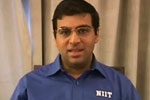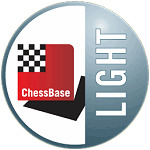
World Championship 2007 Mexico
The World Championship 2007 will take place from September 12 to 30 in the
Sheraton Centro Histórico Hotel in Mexico City. Eight players are qualified
– the tournament will be a double round robin. The prize fund is US $1.3
million.
Commentary by GM Mihail Marin
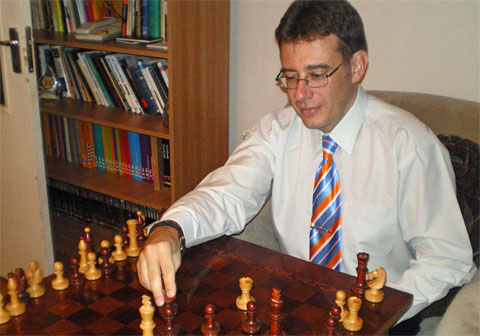
GM Mihail Marin in his analysis kitchen at home in Romania
The following express commentary was provided by Romanian Mihail Marin,
who is the author of a number of very popular ChessBase training CDs and articles
for ChessBase Magazine. GM Marin will study the games of the World Championship
tournament in much greater detail and provide the full results of his analysis
in the next issue of ChessBase
Magazine.
Round fourteen commentary by GM Mihail Marin
In a sharp line of the Najdorf, Svidler improved upon his play against Topalov
in San Luis 2005. Grischuk was just one move too slow in building his counterplay
and found nothing better than simplify to a hopeless ending. Anand chose a safe
plan against Leko's Marshall Attack and had little trouble to reach the draw
that ensured him the supreme title.
Morozevich-Gelfand was an interesting hard-fought game. After missing a far
from obvious possibility to get an advantage, Morozevich was left with just compensation
for the sacrificed exchange, eventually leading to a draw. Aronian reacted badly
against Kramnik's novelty in a modern line of the Queen's Indian and went down
without too much fight.
Svidler,P (2735) - Grischuk,A (2726) [B90]
WCh Mexico City MEX (14), 29.09.2007 [Mihail Marin]
1.e4 c5 2.Nf3 d6 3.d4 cxd4 4.Nxd4 Nf6 5.Nc3 a6 6.Be3 Ng4 7.Bg5 h6 8.Bh4
g5 9.Bg3 Bg7 10.h3 Ne5 11.Nf5 Bxf5 12.exf5 Nbc6 13.Nd5 e6 14.fxe6 fxe6 15.Ne3
15...Qa5+ 16.c3 Nf3+. In San Luis, Topalov managed to surprize and defeat
Svidler with this slightly exotic variation. Grischuk's decision to repeat the
experiment looks a bit risky, because Svidler had obviously analyzed the position
himself, disposing over the invaluable advantage of having faced the variation
in a practical game.
17.Qxf3 Bxc3+ 18.Kd1 Qa4+ 19.Nc2 Bxb2
20.Rc1!? Here comes the novelty! The aforementioned game went 20.Qb3 Qxb3
21.axb3 Bxa1 22.Nxa1 Ke7 and White's pieces were more passive than in the present
game.
20...Bxc1 21.Qf6 Kd7. Another possibility would be 21...Bb2 22.Qxb2
e5 , but after 23.Bd3 White's position looks preferable anyway.
22.Kxc1 Qxa2.
I suppose that this move was not so much dictated by grediness as by the
concern about the e6-square. However, the developing move 22...Rac8 might have
offered better chances for counterplay.
23.Bd3 Rac8 24.Rd1
White has completed his development (true, not in a very ortodox way) and is the
first to create strong threats against the enemy king.
24...d5. For instance,
the tempting 24...Nb4? , threatening mate in two, loses to 25.Bb5+! followed by
Rxd6+.
25.Bf5 Rhe8 26.Qf7+ Kd8. It might seem that Black has defended and
can think about finally launching his counterplay against the c2-knight.
27.Re1!!
A very strong move, increasing the pressure against the e6-pawn.
27...Qa3+
The simplifications initiated by this move will not bring Black any relief,
but it is hard to suggest an improvement. The key point is that Black is still
slow with his counterplay. For instance, 27...Nd4? loses the knight to 28.Qf6+;
while 27...Nb4 allows an attack with checks: 28.Qf6+ Re7 29.Qf8+ Kd7 30.Bxe6+
Rxe6 31.Qf7+ Kd8 32.Qg8+!
28.Nxa3 Ne5+ 29.Kd2 Nxf7 30.Bxe6 Rc6 31.Bxf7 Rxe1
32.Kxe1 b5 33.Kd2
White has a decisive material advantage, maintaining an acceptable coordination.
The rest is easy. 33...b4 34.Nc2 b3 35.Nd4 Rb6 36.Kc1 a5 37.Bxd5 a4 38.Be5
b2+ 39.Kb1 a3 40.Ba2 Rb7 41.Bd6 Rd7 42.Nb5 1-0. [Click
to replay]
Anand,V (2792) - Leko,P (2751) [C89]
WCh Mexico City MEX (14), 29.09.2007 [Mihail Marin]
1.e4 e5 2.Nf3 Nc6 3.Bb5 a6 4.Ba4 Nf6 5.0-0 Be7 6.Re1 b5 7.Bb3 0-0 8.c3
d5. Nowdays, the Marshall Attack can hardly be considered an aggressive
weapon. White can make a draw almost by force, if he really wants to. 9.exd5
Nxd5 10.Nxe5 Nxe5 11.Rxe5 c6 12.Re1 Bd6 13.d3 Bf5
14.Nd2 Instead of sticking to his small material advantage, White hurries
to complete his development and... win the World title. 14...Nf4 15.Ne4 Nxd3
16.Bg5 Qd7 17.Nxd6 Qxd6 18.Bc2 Qg6 19.Bxd3 Bxd3 20.Be3. Opposite coloured
bishops, symmetrical position, no significant weaklnesses for any side... Yes
a draw is the most liley result. Long live the new Champ! 1/2-1/2. [Click
to replay]
Morozevich,A (2758) - Gelfand,B (2733) [C42]
WCh Mexico City MEX (14), 29.09.2007 [Mihail Marin]
1.e4 e5 2.Nf3 Nf6 3.Nxe5 d6 4.Nf3 Nxe4 5.d4 This Gelfand's fourth
game with the Petroff in this tournament, but the first time when he faces the
classical main line. His opponents from the previous games played 5.Nc3. 5...d5
6.Bd3 Nc6 7.0-0 Be7 8.Re1
8...Bg4. Nowadays, 8...Bf5 is almost universally played and White usually
gets big headaches trying to break Black's fortress. We cannot know whether Gelfand
had prepared the slightly more active bishop for the whole tournament or just
specially for this game.
9.c4 Nf6 10.Nc3 Bxf3 11.Qxf3 Nxd4 12.Qd1 Ne6 13.Bf5
13...d4!? Almost never played before. The main continuation is 13...dxc4.
14.Ne2 d3 15.Nf4 Nd4 16.Bxd3. As expected, White has won the courageous
pawn, but his pieces have been distracted from the control of the d4-square, allowing
Black to install his knight there.
16...0-0 17.Be3 Bc5. A new move. In
the only game where 13...d4 was played, Black prefered 17...Bb4 , Polgar-Shirov
1999. We can note Gelfand's different treatment of his bishops. His queen's bishop
made a longer move than in the main stream of theory, while his colleague stopped
just one square earlier than in the previous game.
18.Qb1!? The start of
a far from natural regroupment.
18...Qd6 19.Rd1 Qe5 20.Bxh7+!? Nxh7 21.Nd3
Qf5 22.Nxc5 Nc2 23.b4
A curious position. White has won a pawn and keeps the enemy knight pinned. However,
his queenside pieces are temporarily stuck. For instance, the queen cannot move
because of ...Nxa1.
23...Qg6?! This careless move, dictated by the understandable
desire to unpin the knight as soon as possible, will remain unpunished. Only further
analysis will prove which would have been the bets way to maintain the tension.
24.a4. Missing the spectacular 24.Ne6! The knight's incursion with gain
of time is unpleasant enough (it could soon reach such a central square as d5),
but the point is that after 24...fxe6 the queen remains undefended, allowing 25.Rd2
with a sound extra-pawn for White.
24...Nxa1 25.Qxg6 fxg6 26.Rxa1 Nf6 27.h3
Rfe8 28.a5
White has sufficient compensation for the exchange, because of his active minor
pieces and advantage of space on the queenside. 28...b6 29.Nb3 Ne4 30.c5
bxc5 31.Nxc5 Nc3 32.Na6 Nd5 33.Rc1 Nxe3 34.fxe3 Rxe3 35.Rxc7 Re2 36.Kh2 Rf8
37.Rxa7 Rff2 38.Kg3 Rxg2+ 39.Kf3 Rgf2+ 40.Kg3 Rg2+ 41.Kf3 Rgf2+ 42.Kg3 g5 43.b5
Rf4 44.b6 Re3+ 45.Kg2 Re2+ 1/2-1/2. [Click
to replay]
Kramnik,V (2769) - Aronian,L (2750) [E15]
WCh Mexico City MEX (14), 29.09.2007 [Mihail Marin]
1.d4 Nf6 2.c4 e6 3.Nf3. For the first time in this tournament, Kramnik
refrains from the Catalan. Aronian usually answers 3.g3 with 3...c5 4.d5 exd5
5.cxd5 b5 and in fact lost his last two games (against Kramnik himself, in their
rapid match earlier this year and against Gelfand, here in Mexico.) 3...b6
4.g3. Still, the bishop goes to g2, which seems to suit Kramnik's taste
these days. 4...Ba6 5.b3 Bb4+ 6.Bd2 Be7 7.Bg2 c6 8.Bc3. This was the
last chance to transpose to a genuine Catalan with 8.0-0 d5 9.Qc2 , although
some might call it a Bogo Indian. 8...d5 9.Ne5 Nfd7 10.Nxd7 Nxd7 11.Nd2 0-0
12.0-0 Rc8 13.e4 dxe4 14.Nxe4 b5 15.Re1 bxc4
There have been some discussion in this line lately, but theory is far from being
settled yet.
16.Bf1. The main alternative is 16.Qe2.
16...Nb6. Aronian
had had this position before, but with the white pieces. However, this previous
experience hardly was useful to him for this game because in Aronian-Nakamura,
Armenia 2005, a draw was agreed right here.
17.Rb1!? It is curious that
this natural developing move, bringing the last piece into play (true in a not
entirely "normal" position) is a novelty. Earlier, White mainly tried
17.Nc5.
17...Nd5 18.Ba1 Bb4. These last attacking moves win an exchange
almost by force, but leave Black poorly coordinated. Maybe he should look for
a way to answer 17.Rb1 with just another developing move, but which? The only
possibility that comes up to mind is 17...Re8, but it is not easy to spot in which
way this move could be useful. Maybe by avoiding the fork on d7 in case of the
generally desirable ...Qb6!?
19.Nc5! Bxe1 20.Qxe1 cxb3. This move is hard
to understand. Black will simply lose material, without getting any compensation
for it. True, after 20...Nc7 21.bxc4 , Black's minor pieces are miserably placed,
but then the criticism should be focused on the 17th and, possibly, 18th moves
only.
21.Nxa6 bxa2 22.Rb2
The rest is a matter of technique. 22...Nc7 23.Rxa2 Nxa6 24.Rxa6 Qd7 25.Qc3
f6 26.Qc5 Rf7 27.Bc3 Qb7 28.Qc4 Qd7 29.Bg2 Kh8 30.Bxc6 Qb7 31.Kg2 h6 32.d5 Qb8
33.dxe6 Re7 34.Bb4 Rec7 35.e7 1-0. [Click
to replay]
Interviews with Anand
By Vijay Kumar
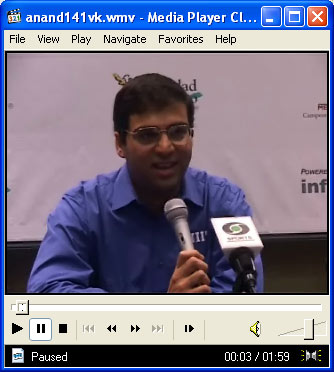
Click to replay interview
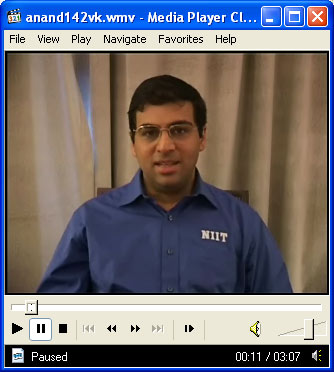
Click to replay interview
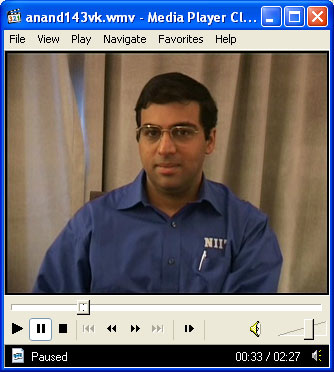
Click to replay interview
All results of the round
| Round 14: Saturday, Sept. 29th 2007, 14:00h |
Peter Svidler |
1-0 |
Alexander Grischuk |
Viswanathan Anand |
½-½ |
Peter Leko |
Alexander Morozevich |
½-½ |
Boris Gelfand |
Vladimir Kramnik |
1-0 |
Levon Aronian |
| |
Final standings

Links
